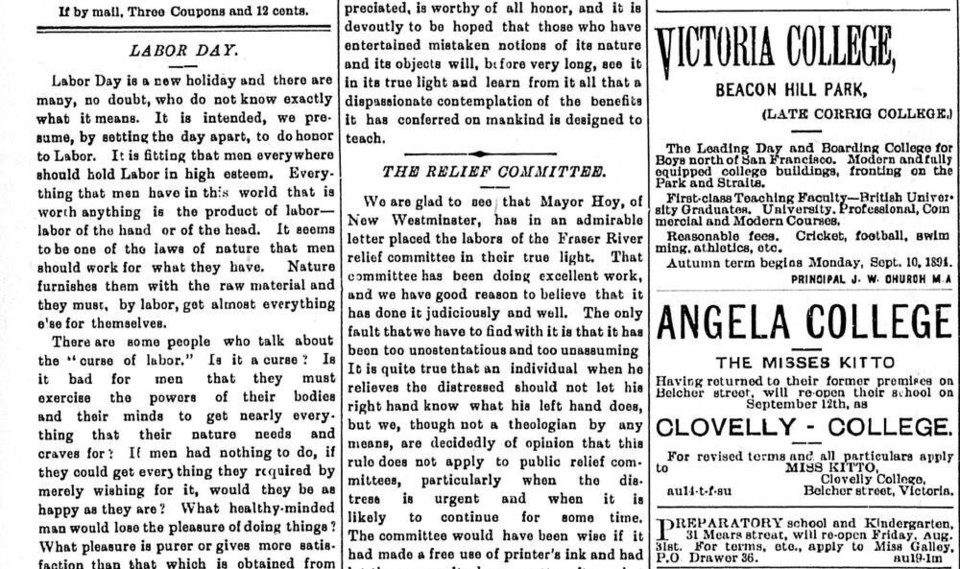Everything that we have that is worth anything is the product of labour, of the hand or of the head. That’s hardly a new idea; in fact, it was a key point in the first Labour Day editorial published on our pages — or more precisely, our predecessor, the Daily Colonist — on Sept. 2, 1894, the day before the first national holiday in honour of working people.
The editorial reflects its times; for example, there are a dozen references to males in the workforce, a pointed snub of the women who were also working. (Admittedly, women employed outside the home were very much in the minority 129 years ago, but plenty of them held paying jobs.)
Beyond that, many of the points made in the 1894 editorial ring true today, noting as it does that labour should be held in high esteem.
“It seems to be one of the laws of nature that men should work for what they have,” the editorial says. “Nature furnishes them with the raw material and they must, by labour, get almost everything else for themselves.”
It also asks if we could be as happy as we are if we had nothing to do, and could get everything we required by merely wishing for it.
“What healthy-minded man would lose the pleasure of doing things? What pleasure is purer or gives more satisfaction than that which is obtained from exercising the powers of our bodies or our minds for some useful purpose?
“This is a pleasure about which very little is said, but it is one which all who have endeavoured to do anything useful have felt. Besides the enjoyment there is in the exercise of the powers of the mind and the body, that exercising is the only way of developing them.”
The 1894 editorial painted a rather bleak picture of what human life would be like without labour. “Men and women would lead a dreary animal existence, and they would be useless, unformed creatures,” it says.
“Labour, strenuous labour, continued through centuries, has transformed the savage, clad in skins and living in caves, into the civilized man who has conquered the earth and who makes all parts of the world minister to his necessities.
“It has changed him from a wild creature, only a little above the brutes in intellectual power, into a high-minded philosopher or a deep-thinking man of science, who has by hard and persistent labour wrung from nature her deeply-hidden secrets and made her forces obedient to his will.
“Should not labour then be held in high honour? Not one particular kind of labour, but all kinds, for they have been all necessary to the progress and the happiness of mankind.”
The editorial dismisses the idea, apparently promoted by some labour advocates, that labour and capital are natural enemies.
“Capital and labour are as necessary to each other as the right hand to the left, or as the head is to the hand,” it said. “It may be true that the proper relation between them has not yet been discovered, but it is clear that whatever it is, it is not that of warfare.”
The editorial expressed hope that recent “unseemly and ruinous contests” — labour disruptions — would be looked back upon “with a shudder as a bad dream or as the frightful mistake of deluded, ill-advised and over-excited men.”
And the final note from this weekend in 1894:
“Labour, then, properly understood and rightly appreciated, is worthy of all honour, and it is devoutly to be hoped that those who have entertained mistaken notions of its nature and its objects will, before very long, see it in its true light and learn from it all that a dispassionate contemplation of the benefits it has conferred on mankind is designed to teach.”
>>> To comment on this article, write a letter to the editor: [email protected]



